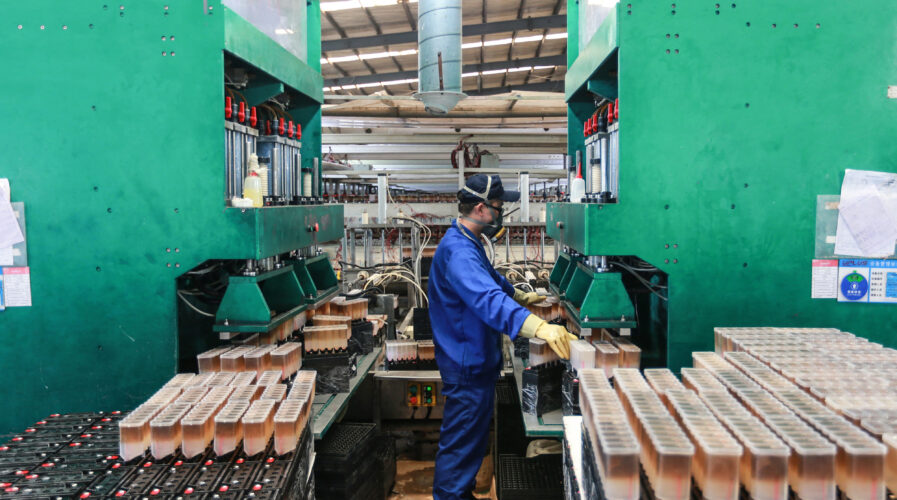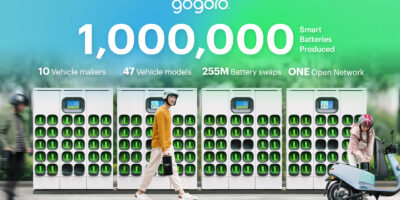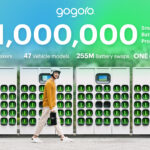
Is China’s CATL considering an EV battery production site in the US?. (Photo by AFP) / China OUT
Tesla’s supplier CATL is weighing North America for US$5 billion EV battery plant
- CATL is planning for more EV battery plants, this time in North America, after its first overseas plant in Germany.
- A manufacturing footprint in North America will be crucial to avoid costly trade tariffs while supplying Tesla and other automakers.
- CATL has to play catch up as competition heats up and EV demand reaches new heights.
Electric vehicle (EV) batteries have been dominating headlines over the last one year. The blizzard of announcements ranged from capacity expansions, mergers and acquisitions and even the lack of raw materials to meet soaring demand. In an effort to fend off rising competition, the world’s largest battery maker, China’s CATL, is reportedly surveying sites across North America for a massive US$5 billion plant to meet the demand of its customers including Tesla Inc.
Having established itself as the world’s largest manufacturer of EV batteries, thanks to its strong position in China’s fast-expanding domestic EV market in recent years, CATL is said to be exploring localizing production in the United States (US). Even other manufacturers, particularly the South Koreans, have been positioning themselves to benefit from strong growth in global markets, particularly in Europe and North America.
Reports last month suggested CATL’s chairman Robin Zeng Yuqun, speaking at a closed meeting with investors, confirmed that the company is “exploring the feasibility of localizing production in the US”. Apparently, CATL has held discussions with a number of potential US clients, including incumbent and recently established automakers, to discuss potential supply relationships including technologies and costs.
That said, in a report by Bloomberg, CATL is said to be “considering sites across North America for a massive US$5 billion plant to supply customers including Tesla Inc.” People familiar with the matter said the company aims to build a factory capable of producing as much as 80 gigawatt-hours of batteries a year. The facility would eventually employ as many as 10,000 workers.
CATL, at this point, holds about a 30% share of the global EV battery market. At this point, CATL only has one overseas manufacturing operation in Germany, but because the Chinese government plans to phase out domestic EV subsidies by the end of 2022, it plans to diversify its overseas operations further.
To be fair, a manufacturing footprint in North America will be crucial to avoid costly trade tariffs while supplying Tesla and other automakers. CATL dominates the market for Lithium iron phosphate (LFP) batteries, and Tesla already uses LFP cells supplied by CATL at the latter’s Shanghai factory.
The new North American plant would apparently produce a mix of nickel-manganese-cobalt and LFP cells, and supply both Tesla and other automakers, people familiar with the matter told Bloomberg. Auto giants like Daimler Truck Holding AG, BMW, Stellantis NV and BAIC Motor Corp are also CATL’s customers from around the world.
The global EV boom since the second half of 2020 has led battery makers to expand capacity as newcomers join the race, heating up competition. Even CATL’s rival LG Energy Solution Ltd. vowed to outperform the world’s top battery player CATL as the South Korean company recorded the country’s largest-ever IPO.
For LG, CATL’s sales growth has mostly been backed by Chinese automakers with its client base largely limited to China. LG on other hand, believes its wider range of customers globally, give it an added advantage. Hence, looking at how LG has manufacturing facilities in the US and Europe as well as in China, CATL has no choice but to catch up.
CATL even launched a series of investments in the industry from upstream material supplies to auto manufacturing in an effort to build a business ecosystem. As of the end of September 2021, CATL has made 3.59 billion yuan of investments in 21 battery material producers and 3.11 billion yuan in equipment makers, according to company filings.
The EV battery maker has even invested and created partnerships with more than 100 companies. The company made equity investments in EV makers including BAIC BluePark New Energy, Airways Automobiles, Hozon Auto and ACATR. It also set up joint ventures with leading automakers such as SAIC Motor, GAC Group and Dongfeng Motor, Nikkei stated.
READ MORE
- Ethical AI: The renewed importance of safeguarding data and customer privacy in Generative AI applications
- How Japan balances AI-driven opportunities with cybersecurity needs
- Deploying SASE: Benchmarking your approach
- Insurance everywhere all at once: the digital transformation of the APAC insurance industry
- Google parent Alphabet eyes HubSpot: A potential acquisition shaping the future of CRM


